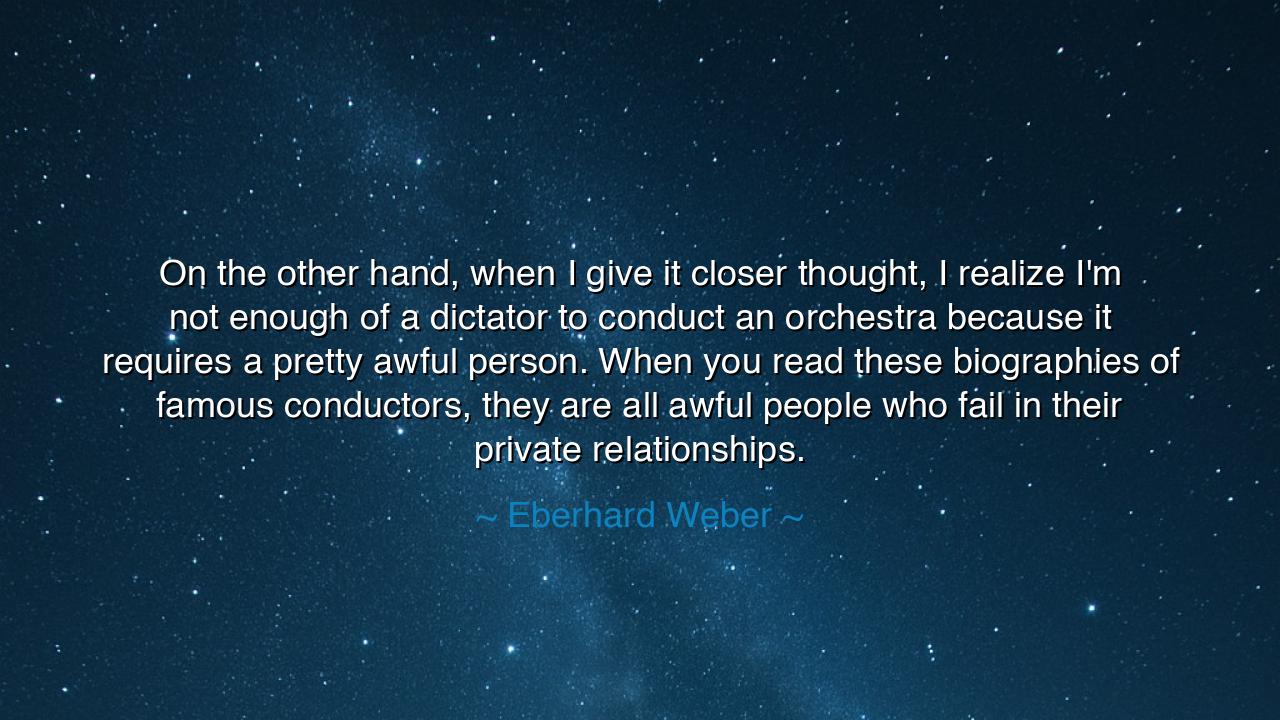
On the other hand, when I give it closer thought, I realize I'm
On the other hand, when I give it closer thought, I realize I'm not enough of a dictator to conduct an orchestra because it requires a pretty awful person. When you read these biographies of famous conductors, they are all awful people who fail in their private relationships.






Host: The quiet hum of the room sets a reflective mood as Jack and Jeeny sit across from each other, pondering the complexity of the quote they’ve just read. Eberhard Weber’s words are laced with a certain irony, and there’s a palpable sense of curiosity between them. Jack leans forward slightly, clearly mulling over the deeper implications of the quote.
Jeeny: "Eberhard Weber once said, 'On the other hand, when I give it closer thought, I realize I'm not enough of a dictator to conduct an orchestra because it requires a pretty awful person. When you read these biographies of famous conductors, they are all awful people who fail in their private relationships.' That’s a pretty bold statement, right? It almost feels like he’s questioning the very nature of leadership in certain fields. Do you think being a great leader requires sacrificing personal relationships, or can you truly excel without compromising who you are in your personal life?"
Jack: He nods slowly, his voice becoming more reflective. "It’s an interesting perspective. I think what Weber is getting at is the intensity of leadership—particularly in fields like conducting, where you’re required to maintain absolute control and make quick, often harsh decisions. It’s easy to imagine how that kind of pressure could lead to a lack of empathy or understanding in personal relationships. Being a leader in those environments often means prioritizing the task over personal connections, which can create a kind of emotional distance from others." He pauses, looking at Jeeny. "But that doesn’t necessarily mean it’s the only way to lead. It just might be a result of how intense and demanding those roles can be."
Jeeny: "Right. There’s something almost tragic about that, isn’t there? The idea that to be great at something, you might have to sacrifice the very things that make life meaningful—like relationships, understanding, or kindness. But then, it also raises the question: is that what greatness requires? Is there really a trade-off between success and personal fulfillment, especially when it comes to highly demanding fields like conducting or leadership in general?" She leans in slightly, her voice softening with curiosity. "Could someone be truly successful and still maintain a sense of balance in their personal life?"
Jack: "I think it’s possible, but I think it takes a very particular kind of person—someone who can navigate the line between demanding excellence and maintaining empathy. Maybe what Weber is saying is that most people who are in positions of power or leadership don’t necessarily make the best personal partners because they’ve invested so much of their energy into their craft that they lose the capacity to nurture those personal relationships." He shrugs lightly. "But there’s also a truth in the idea that greatness doesn’t always come without a price. Sometimes, people have to make sacrifices to reach the top."
Jeeny: "It’s a hard truth to accept. We often idolize these larger-than-life figures—whether they’re conductors, CEOs, or artists—thinking that their success is the ultimate achievement. But Weber’s point brings attention to the human cost of that success. It’s like we’re told that to be the best, we have to be single-minded, driven, maybe even ruthless. And yet, in doing so, we risk becoming disconnected from what really matters." She looks at Jack with a thoughtful expression. "Maybe the real question is, can true success be about both excellence in your field and meaningful relationships?"
Jack: "Maybe it depends on how we define success. If we only see success as being the best in the world at something—if it’s about external validation—then maybe we do have to sacrifice other things. But if success is about leading a balanced life, where your personal relationships, your emotional health, and your work all come together, then maybe that’s a different kind of greatness." He smiles slightly, his voice steady. "It’s about finding a way to be authentic in both your work and your life. But that balance is hard to strike, especially when you’re pushing toward the top."
Jeeny: "Yeah, it’s that balance that makes the whole conversation so complex. I think Weber’s perspective highlights the duality of ambition—the desire to be the best, to achieve greatness, but also the human cost of that pursuit. It's almost like we're asked to choose between the two, when in reality, it’s more about finding a way to blend them." She pauses, her voice softening. "Maybe true greatness isn’t about sacrificing relationships for your work. Maybe it’s about finding a way to make both work together, without compromising one for the other."
Host: The room feels still, the weight of the conversation settling in. The question Weber’s words pose—about the cost of greatness and the sacrifices that come with it—lingers in the air. Jack and Jeeny sit quietly, contemplating the idea that success doesn’t have to come at the expense of personal fulfillment. While some may argue that being the best requires a level of detachment, others may find that true success lies in balance—in excelling at what you do without losing sight of the human connections that make life rich and meaningful.
As the evening fades, the conversation leaves them both with a new understanding: greatness is not a one-size-fits-all path. Whether it’s in conducting, leadership, or any other field, the question isn’t just about how high we climb, but how we choose to live and love along the way.






AAdministratorAdministrator
Welcome, honored guests. Please leave a comment, we will respond soon